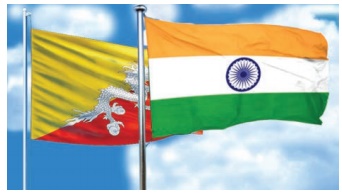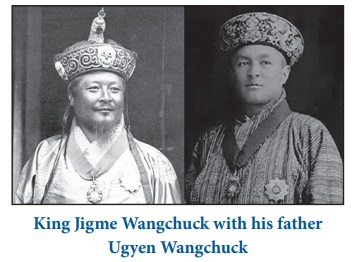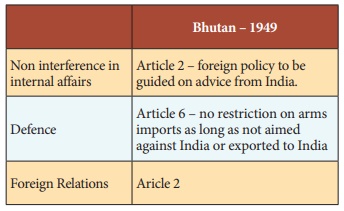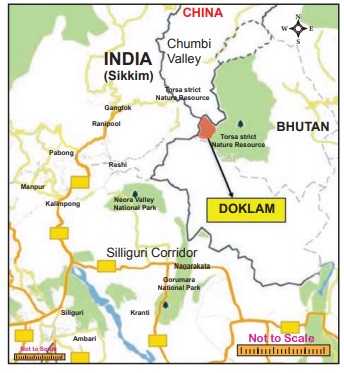Chapter: 12th Political Science : Chapter 10 : India and It’s Neighbours
India - Bhutan Relations
India - Bhutan Relations

India shares a special relation with Bhutan. Being
a land locked country, Bhutan is depended on India for most of its products and
financial support and India on its part has been providing all possible
support. This makes both the countries ideal example for good neighbourly
relations.

Timeline of events:
1. Treaty
of Punaksha (1910): Bhutan
become protectorate state of British India. It means Bhutan to have
internal autonomy and not external autonomy
2. Treaty
of Friendship and Cooperation(1949) : India and Bhutan signed the Treaty of Peace and
Friendship on August 8, 1949, in Darjeeling.
·
The treaty is termed as the continuation of the
Anglo-Bhutanese Treaty of 1910. It treats the Himalayas as the sentinel of
India’s security
·
The Indo-Bhutan Treaty is dubbed as the corner
stone of Bhutan’s foreign policy.
Diplomatic relations between India
and Bhutan was established in 1968 with the appointment of a resident
representative of India in Thimpu. Before this India’s relations with Bhutan
were looked after by the Political Officer in Sikkim.
On India’s initiative, Bhutan has
become a member of the Colombo Plan in 1965, joined Universal Postal Service in
1969 and finally India sponsored Bhutan’s membership in 1971. Bhutan’s
relations with the NAM (Non- Aligned Movement) countries is yet another
initiative of India.

Revised treaty (2007)
On request of Bhutan, India revised treaty of
friendship and cooperation
·
It has been suggested that the revised one modifies
India’s role from guiding partner to a close friend and equal partner.
·
Under the revised norms Bhutan no longer require
India’s approval over importing arms.
·
There are no limitations for Bhutan with respect to
other countries, but it cannot use its territory for activities against India’s
security threat.
3. India-Bhutan
Trade And Transit Agreement (1972): It provides for duty-free transit
of Bhutanese exports to third countries.
Treaty of
Cooperation in Hydropower and Protocol (2006): Under this, India has agreed to assist Royal government
of Bhutan in developing a minimum of 10,000 MW of hydropower and import the
surplus electricity from this to India by the year 2020.
Areas of cooperation Hydropower Cooperation
·
India has constructed three hydroelectric projects
(HEPs) in Bhutan totaling 1416 MW.
·
Hydropower exports provide more than 40% of
Bhutan’s domestic revenues and constitute 25% of its GDP.
·
Presently, there are three Inter-Government(IG)
model is under construction.
Security Cooperation
Both the countries have conducted joint military
operation against insurgents. The most notable was in 2004 when the Royal
Bhutanese army conducted operations against ULFA (United Liberation Front of
Assam).
Diplomatic Cooperation
Regular visits between highest level Government
functionaries of both the countries have become a tradition. For example, in
2014, our Prime Minister chose Bhutan as his first country to visit after
getting elected. India sends foreign service officers to Bhutan to maintain
good diplomatic relations.
Bhutan is a founding member of the South Asian
Association for Regional Cooperation (SAARC). It is also a member of BIMSTEC,
World Bank, the IMF, Group of 77 and others.
Economic Cooperation
Bhutanese currency is Ngultrum (Nu.) and is
officially pegged to the Indian Rupee (Rs.).
India remains the single largest trading partner of
Bhutan.

In 2016 a new trade agreement was signed. This
agreement aims at cutting down the documentation related to trade and
establishing additional trading points in Bhutan.
India also offers duty free transit to Bhutan for
trade with third countries.
Educational and Cultural cooperation
Many Bhutanese students pursue under-graduate
courses in Indian universities on self-financing basis.
India-Bhutan foundation was established in 2003 for
improving people to people cooperation in the areas of culture, education and
environment protection.
Gross Nations Happiness
The fourth King of Bhutan King Jigme
Singye Wangchuck coined the phrase “Gross Nations Happiness” in 1972 and declared
that is more important than GDP.
Areas of Contentions
The Motor Vehicles Agreement that was signed in
2015 involving Bangladesh, Bhutan, India and Nepal (BBIN) was blocked by
Bhutan’s upper house citing environmental concerns.
Growing and unsustainable trade imbalance is in
favor of India. Bhutan’s trade deficit is set to worsen as India’s Good and
Services Tax (GST) makes its exports to Bhutan cheaper and imports from Bhutan
more expensive
Bhutan wants to increase its export power tariff to
India as it is lesser than the cost of production.
Bhutan has been taken as safe haven by insurgent
elements like National Democratic Front for Bodoland (NDFB), United Liberation
Front of Assam (ULFA) militants and Kamtapur Liberation Organization (KLO) that
often pose threat to internal peace and security in the northeast region of
India.
Doklam Issue
Doklam, or Donglang in China, is an area spread
over less than a 100 sq km comprising a plateau and a valley at the trijunction
between India, Bhutan and China. It is surrounded by the Chumbi Valley of
Tibet, Bhutan’s Ha Valley and Sikkim.
Despite several rounds of engagement between China
and Bhutan, the dispute between the two over Doklam has not been resolved. It
flared up in 2017 when the Chinese were trying to construct a road in the area,
and Indian troops, in aid of their Bhutanese counterparts, objected to it
resulting in the stand-off. Doklam is strategically located close to the
Siliguri corridor, which connects mainland India with its north-eastern region.
The corridor, also called Chicken’s Neck, is a vulnerable point for India. In
recent years however, China has been beefing up its military presence in the
Chumbi Valley, where the Chinese are at a great disadvantage militarily. Both
Indian and Bhutanese troops are on a higher ground around the Valley.

Issue with Hydropower projects
·
Bhutan supplies power to India at very cheap rate.
·
Bhutan alleged that India wanted greater role in
management on joint venture Hydro projects in Bhutan.
·
Cross Border Trade of Electricity (CBTE) issued by
power ministry will establish the monopoly of India being Bhutan’s sole power
market. It restricts the type of hydro power investments that could be made in
Bhutan.
·
Hydro power plants are also attached with certain
environmental concerns.
Steps taken to boost relations
·
There is a frequent visit of state heads to boost
the bilateral relations.
·
India announced assistance for establishment of an
E-Project covering all the 20 districts of Bhutan.
·
The Prime Minister coined the idea of B2B as
‘Bharat to Bhutan’ for building effective and renewed bilateral relationship.
·
Bhutan recently become the largest beneficiary of
India’s foreign aid.
·
A 1,000 strong Indian Military Training Team
(IMTRAT) is permanently based in western Bhutan to train the Royal Bhutan Army,
while other units regularly cooperate with the Royal Bhutan Army.
Way Ahead
1. India-Bhutan relationship is like ‘milk and water’. They cannot be separated. Therefore India should leave no stone unturned to maintain good relations with Bhutan.
2. India needs to complete some of the hydropower
projects that were delayed due to lack of funds.
3. India has a very good relationship with Bhutan
whereas China has many border disputes with Bhutan. This relationship and
goodwill must be maintained to counter China’s strategic calculations in Bhutan
and the region.
4. India needs to augment the connectivity of
Bhutan and its North Eastern states for the region’s economic development.
5. India needs to combine the Gross National
Happiness of Bhutan with its own economic development to maintain a shared
prosperity and relationship between the two countries.
Related Topics